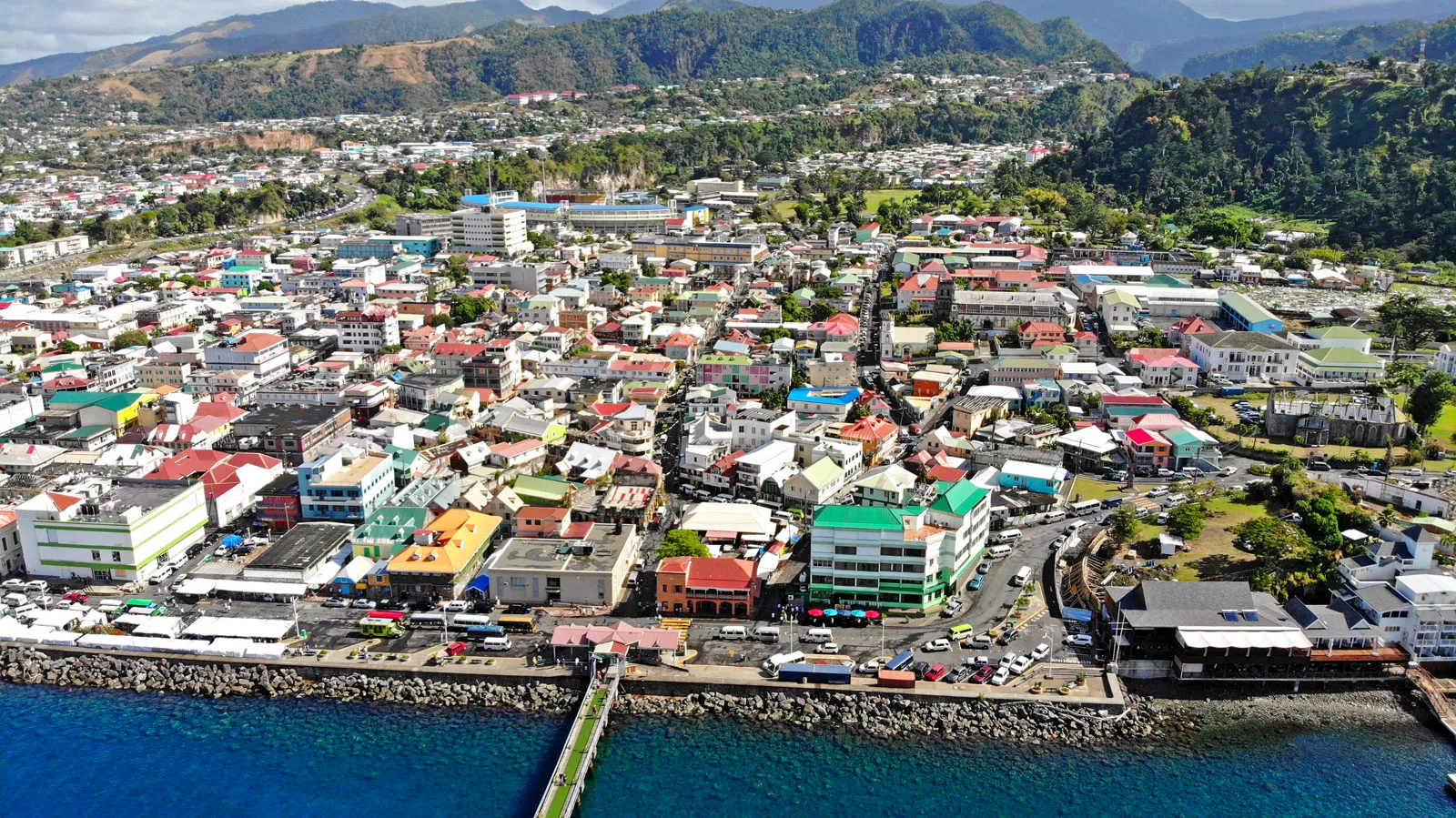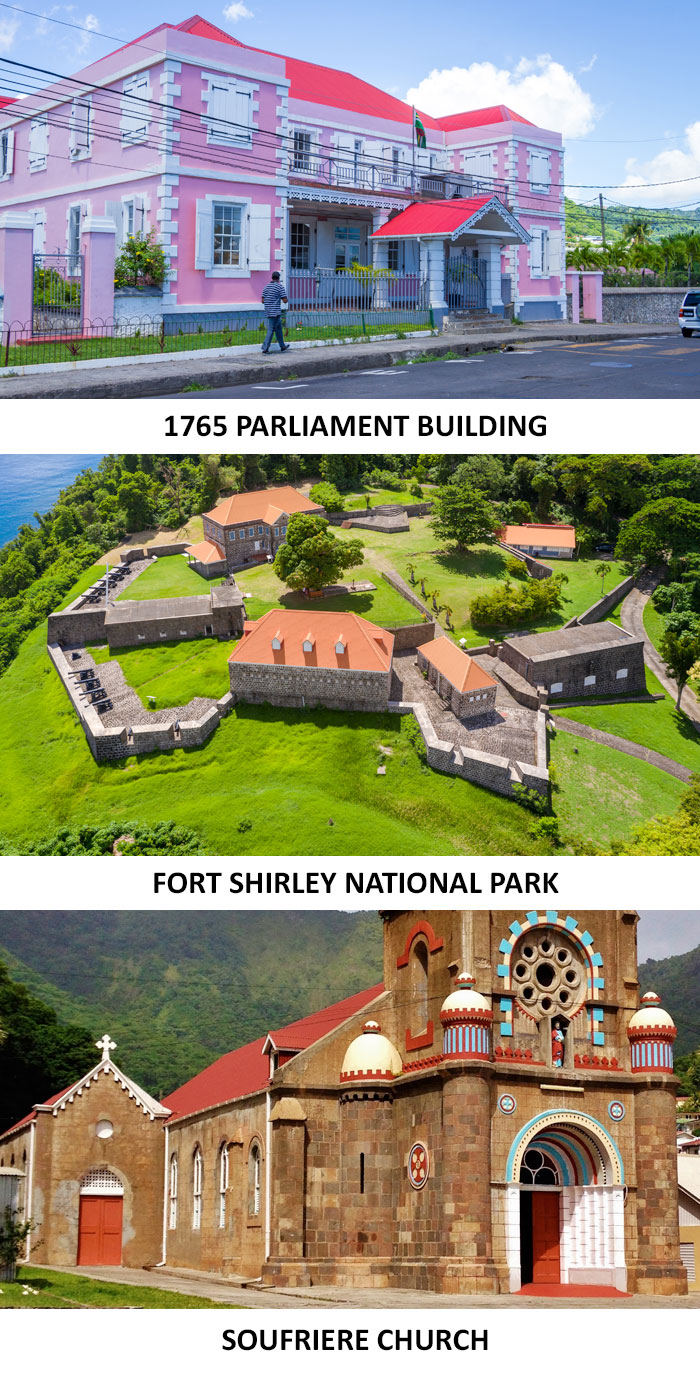Frequently Asked Questions

DOING BUSINESS IN DOMINICA
- Environmental Levy – 1-1.5%
- Customs Service Levy – 4%
- Excise Tax- 28% Port Charges
Businesses undertaking investment in Government’s priority area may be considered for fiscal incentives, once all other requirements are met. The IDA will advise of the various requirements and the process to apply for fiscal incentives.
It is recommended that before meeting with a lawyer that the IDA is contacted to guide you in the various process of doing business.
There are a number of banks which can provide financing for non-nationals. All requirements as indicated by the specific bank must be met.
This rule does not exist. Additionally, there is no restriction on foreign business ownership in Dominica.
The website of IDA provides a directory of many professionals. Additionally some information can be found on line through the local yellow pages.
An alien may hold less than one (1) acre of land for residential purposes or less than three (3) acres of land for commercial purposes without obtaining an alien landholding license. However, the alien landholding license fee of 10% of the value of the land is payable.
Yes, fees may be waived for approved projects. The application for this process has to be filed to the Ministry of Agriculture and Forestry.
Land purchased under the alien land holding license is subject to specific terms. With regard to selling or sub-dividing, permission, in writing must first be obtained from the Government. Aliens are asked to adhere closely to the terms and conditions as stipulated.
Prior to purchasing any land, you should seek clarification from the Ministry of Lands as to the type of activity which is possible within the area. Purchase of land within the National Park is restricted.
Yes persons living outside of Dominica can purchase land on the island, subject to the Alien Landholding License.
A corporate entity or individual who is not a citizen of the Organization of Eastern Caribbean States (OECS), or a None “Belonger” in the case of Montserrat, who is seeking to acquire land may require a license prior to the execution of the transaction depending on the amount of land to be purchased. An alien may not hold more than one (1) acre of land for residential purposes or three (3) acres of land for commercial purposes without first obtaining a license. View Act Here
Based on British Common Law – ultimate right of appeal Caribbean Court of Justice.
LIVING IN DOMINICA
Contact the Citizenship by Investment Unit and Labor Division for answers that are specific to your situation.
Children travelling with persons to Dominica can attend school. Proof of status – work permit/resident/citizens must be submitted to the School.
Planning permission is required to make major structural changes on buildings which are purchased. It is advisable to seek the Planning Division input on these matters.
In Dominica, the Social Security program is designed to partially replace or supplement income lost by Insured Persons during periods of sickness, maternity, employment injury, and old age. When an Insured Person dies, provision is also made to pay a pension to the eligible spouse and children. In the absence of an eligible spouse and children, surviving parents or grandparents over the age of 60 stand to qualify for such benefit. www.dss.dm
The Social Security Act provides that every employee between the ages of 16 and 65 who commences employment in Dominica, must be registered with the Dominica Social Security within 4 days of the commencement of employment.
All employers are required to register with the Dominica Social Security within seven days of hiring an employee.
Employee’s contribution to social security as of 2024 moved to 6.50% and employers are required to contribute 7.75%. Contributions will increase annually by 0.25% alternating between employee and employer until 2031, to arrive at a final contribution of 7.5% by employee and 8.5% by employer.
See below for a list of public holidays.
*For other related National holidays and festival dates – Please visit www.discoverdominica.com.
| Holiday | Date | Weekday | Note |
|---|---|---|---|
| New Year’s Day | Jan 01, 2024 | Monday | Public Holiday |
| Carnival Monday | Feb 12, 2024 | Monday | Public Holiday |
| Carnival Tuesday | Feb 13, 2024 | Tuesday | Public Holiday |
| Good Friday | Mar 29, 2024 | Friday | Public Holiday |
| Easter Monday | Apr 01, 2024 | Monday | Public Holiday |
| Labour Day | May 06, 2024 | Monday | Public Holiday |
| Whit Monday | May 20, 2024 | Monday | Public Holiday |
| Emancipation Day | Aug 05, 2024 | Monday | Public Holiday |
| Independence Day | Nov 03, 2024 | Sunday | Public Holiday |
| Community Service Day | Nov 04, 2024 | Monday | Public Holiday |
| Christmas Day | Dec 25, 2024 | Wednesday | Public Holiday |
| Boxing Day | Dec 26, 2024 | Thursday | Public Holiday |
Mini-buses (look for the number plate that starts with an ‘H’) serve routes from Roseau, Marigot / Douglas Charles Airport and other prominent island locations… and to all villages they are a cheap (often exciting) way to get around the island. Prices are fixed by the government.
VISITING DOMINICA
Contact the Immigration Division for information and instructions.
Immigration Division
Bath Road
Roseau
Dominica
Tel: (767) 266 5139
E-mail: immigration@dominica.gov.dm
When travel documents are lost, this should be reported immediately to the nearest Police Station. If the documents are not found, contact must be made with the Immigration Department where a temporary document can be issued for return travel. Visitors should also make the necessary arrangements with their nearest consulate office for further advise.
The dress code in Dominica is very casual as the tropical climate is available throughout the year. Wearing of swimsuit on the streets is prohibited. Persons are required to dress professionally for business.
In order to travel with pets a visitor must apply to the Livestock Unit in the Ministry of Agriculture and Forestry for an Import Permit for Dogs and Cats. Pets travelling from the United States will be required to have Rabies test done before commencement of travel.
The island of Dominica has a variety of wild life but none poisonous.
All passengers arriving in Dominica require a valid passport and a return ticket. However, proof of citizenships bearing a photograph is acceptable from Canadian and US citizens. French Nationals may visit for up to two weeks with a Carte D’identite.
REACH DOMINICA BY AIR
Douglas Charles Airport is located in the north east of the island. Canefield Airport is located on the west coast of the island.
REACH DOMINICA BY SEA
There are two cruise ship terminals – one at Roseau and one at Cabrits. There is also the Roseau Ferry Terminal and the Woodbridge Bay Port.
Public transport and private taxis are available throughout the island. Taxis are readily available for reasonable prices and can either be arranged from your location of stay or from the street. Inquire about destination prices with someone before hailing a cab. Drivers most generally will take both US and EC dollars. If possible pay with EC. Riders will find most drivers very friendly.
Car rental companies can provide transportation during your stay as well. Remember to drive on the left side of the road while in Dominica.
Mini-buses (look for the number plate that starts with an ‘H’) serve routes from Roseau, Marigot / Douglas Charles Airport and other prominent island locations… and to all villages they are a cheap (often exciting) way to get around the island. Prices are fixed by the government.
You drive on the left side of the road when driving in Dominica.
The average high temperature is 85°F in January / 90°F in July; average low temperature is 68°F in January / 72°F in July. Dry season generally occurs January – May, rainy season from June – October. The south and the west coasts receive about 85 inches of rain annually, while the mountainous interior rain forest gets more than 340 inches per year. Light to moderate showers occur everywhere year round. Hurricane season is predominantly between August and mid-October.
Lightweight shorts and casual shirts. Jeans or slacks are frequently worn for all occasions. Light sweater or long sleeved shirts for cool nights in the mountains could be preferred by some. Pocket or tote sized umbrellas are always a welcome accessory for both sun and rain. Don’t swim or sunbathe topless on Dominica. It’s not considered good taste, nor should you wear swimsuits on the street or in public areas off the beach. When hiking, walking shoes and raincoats or anoraks are recommended, though tennis shoes and sandals can suffice for most occasions.
Yes. Automobiles can be obtained from a few locations so please inquire before you come. If driving, a temporary license will be needed at a cost of US$12 and can be obtained from the car rental company.
Don’t forget – Dominicans drive on the left!
English, French patois and English are spoken in Dominica. English is the official language of Dominica, however, many locals communicate in a hybrid language known as Creole French.
Roman Catholic, Protestant
Roseau is the capital of Dominica. Other principal urban centers are Portsmouth, Grand Bay, and Marigot.
East Caribbean dollar the local currency is the Eastern Caribbean Dollar (EC$). The rate is set at EC$2.68 to US$1.00. Many businesses accept US Dollars, but you will get the most favorable exchange rate at the banks. Major Credit Cards are accepted in most places.
Dominica is one hour ahead of Eastern Standard Time on Atlantic Standard Time. However, Dominica does NOT observe Daylight Savings.
Yes, the Departure Tax in Dominica is:
- Nationals (Passengers traveling with CARICOM documents): XCD 72.00/USD 28.00/ €30.00
- Non-Nationals (Passengers traveling with Non-CARICOM documents): XCD 86.00/USD 33.00/ €36.00
- Nationals in transit: XCD 32.00/USD 12.00/ €14.00
- Non-Nationals in transit: XCD 36.00/USD 14.00/ €17.00
- Children 12 years and under: XCD 27.00/USD 10.00/ €12.00
- Note: Only cash is accepted for payment of departure tax
Dominica maintains a fairly open visa regime for visits to the country lasting less than 21 days. However, nationals of most non Western countries require a Dominican consular visa stamped in a passport.
For further details click here.
Typically, the following do not need a visa to enter into the Commonwealth of Dominica:
Persons wishing to enter into the Commonwealth of Dominica for a period not exceeding six months, from the following countries:
- Countries in the Commonwealth of Nations (Member States of the Commonwealth)
- Czech Republic
- Lithuania
- Estonia
- Poland
- Austria
- Finland
- Romania
- Bulgaria
- Hungary
- Slovakia
- Cyprus
- Latvia
- Slovenia
- CARICOM member states
- Persons from European Union Countries
- Persons with either a Schengen, American, British or Canadian visa
Persons wishing to enter into the Commonwealth of Dominica for a period not exceeding three months, from the following countries:
- Argentina
- Belgium
- Costa Rica
- Denmark
- France
- Germany
- Greece
- Ireland
- Israel
- Italy
- Japan
- Luxembourg
- Malta
- Mexico
- Norway
- Portugal
- South Korea
- Spain
- Suriname
- Sweden
- United Kingdom
- Venezuela
- Netherlands (including Netherland Antilles)

